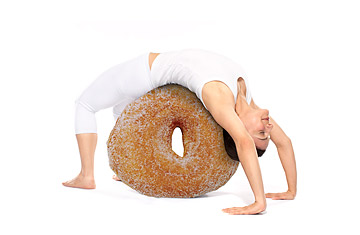
Whether because exercise makes us hungry or because we want to reward ourselves, many people eat more — and eat more junk food, like doughnuts — after going to the gym.
(5 of 7)
Look at kids. In May a team of researchers at Peninsula Medical School in the U.K. traveled to Amsterdam to present some surprising findings to the European Congress on Obesity. The Peninsula scientists had studied 206 kids, ages 7 to 11, at three schools in and around Plymouth, a city of 250,000 on the southern coast of England. Kids at the first school, an expensive private academy, got an average of 9.2 hours per week of scheduled, usually rigorous physical education. Kids at the two other schools--one in a village near Plymouth and the other an urban school--got just 2.4 hours and 1.7 hours of PE per week, respectively.
To understand just how much physical activity the kids were getting, the Peninsula team had them wear ActiGraphs, light but sophisticated devices that measure not only the amount of physical movement the body engages in but also its intensity. During four one-week periods over consecutive school terms, the kids wore the ActiGraphs nearly every waking moment.
And no matter how much PE they got during school hours, when you look at the whole day, the kids from the three schools moved the same amount, at about the same intensity. The kids at the fancy private school underwent significantly more physical activity before 3 p.m., but overall they didn't move more. "Once they get home, if they are very active in school, they are probably staying still a bit more because they've already expended so much energy," says Alissa Frémeaux, a biostatistician who helped conduct the study. "The others are more likely to grab a bike and run around after school."
Another British study, this one from the University of Exeter, found that kids who regularly move in short bursts--running to catch a ball, racing up and down stairs to collect toys--are just as healthy as kids who participate in sports that require vigorous, sustained exercise.
Could pushing people to exercise more actually be contributing to our obesity problem? In some respects, yes. Because exercise depletes not just the body's muscles but the brain's self-control "muscle" as well, many of us will feel greater entitlement to eat a bag of chips during that lazy time after we get back from the gym. This explains why exercise could make you heavier--or at least why even my wretched four hours of exercise a week aren't eliminating all my fat. It's likely that I am more sedentary during my nonexercise hours than I would be if I didn't exercise with such Puritan fury. If I exercised less, I might feel like walking more instead of hopping into a cab; I might have enough energy to shop for food, cook and then clean instead of ordering a satisfyingly greasy burrito.
Closing the Energy Gap
